A few years ago, back home in Maine, my family was observing Passover per usual. By this, I mean we were abstaining from eating any bread or grain products for the eight days of the holiday (this includes oatmeal, pasta, and even beer and most liquor). As a family, we’ve always observed the holiday; regardless of the religious obligation, it’s a fun change for eight days of the year, a fun challenge to follow a totally different diet, to be on your toes every time you’re offered food or head to the kitchen cupboard for a snack.
During this particular Passover a few years ago, in the middle of the eight-day breadless stint, I spent an afternoon running errands with my dad. Upon arriving home with my dad in his car, I went to the trunk to bring in some groceries and, lo and behold, in the corner of the trunk I found a half-eaten sandwich with just about the thickest bread I’ve ever seen. My dad had clearly given in to temptation and tried to keep it hidden from us by storing it in the trunk of his car. We’ve given him a hard time about it every Passover since.
In Israel, even finding a sandwich to hide in the corner of your trunk would have been pretty difficult. As of Friday at sundown, Passover ended here in Israel, allowing us to indulge in some Israeli pita once again (and pasta, and beer, and so on). But in the week of Passover, I found that not only was it incredibly easy to keep, but also quite fascinating. The grocery stores had entire aisles covered with plastic, the restaurants had replaced bread with grain-free tortillas or potato bread, and in the Shuk (the bustling outdoor market in the middle of Tel Aviv), things such as matzah-wrapped hot dogs and stuffed-matzah snacks were being sold left and right. I have never been in a place that so wholly embraces Passover, but also does so in such a creative way. It’s never been less of a challenge keeping Passover. All over the city, the words “Chag Sameach” (but written in Hebrew letters), meaning “happy holiday,” were on storefronts and even on the electronic screens on the front of busses. Israel really knows how to do its holidays.
Not only was Friday night the final night of Passover, but it also marks exactly one month until I leave Israel and head back to the woods of Maine. With the end approaching faster than any of us would like it to, my friends and I are getting increasingly sentimental about this country, this being aided by the fact that Israel’s Independence Day (Yom Hatzmaut) is coming up in early May, so Israeli flags have been put up lining most streets throughout the city, increasing our Israeli pride. But in general, during this week off from school (for Passover), I’ve had a lot of time to explore the city even more and think about what I’ve learned since being here.
I chose Israel for a wide array of reasons. A huge reason is that being Jewish, I automatically feel connected to this place and felt that way before I even came the first time (on Birthright). Another reason is that Israel is a controversial country whose future always seems a little unclear, and as a place that means a lot to me regardless of how much time I’d spent here, I wanted to come to support it and understand it from within its borders. And, of course, I wanted to get some sort of understanding of the politics here, the tensions and the issues that seem to plague the Middle East. And I did, and it’s been eye-opening beyond belief. Studying abroad in Israel is different in that way than in many other places in the world; this country is really, truly hated by many people in a way that is painful to think about considering why the country exists to begin with. Its borders are tense, and while here, hundreds, possibly thousands, of missiles have been fired at Israel from the north and south. I’ve watched videos of girls my age, just a few hours south of me, spending the night in a bomb shelter with the noise of bombs echoing in the background. I’ve listened to Israeli Defense Forces commanders discuss the issues and the procedures they go through to ensure that when they’re responding to attacks on Israel, they’re not intentionally attacking civilians, regardless of who in Israel was targeted. I’ve learned about Israel’s efforts to give aid to Syria and about the life of an Anti-Terrorism commander, how his wife sits by the door each time he responds to an attack and waits there until he comes home.
And I’ve experienced firsthand how Israelis embrace visitors, how patient they are with my slow Hebrew and how welcoming they are to anybody who wants to come to their country. Every Friday night, if you want to attend a Shabbat dinner and you tell a single Israeli this, you’ll receive a handful of invites into strangers’ homes to enjoy Shabbat with them. The same went for Passover Seders.
Overall, it’s a controversial place, and that probably won’t change for a long time. But being here, where it’s so starkly different than America in so many ways, has caused me to really fall in love with the country and the people that inhabit it. And as I look ahead on my calendar to the date that I fly home, I’m already planning my next trip back.








